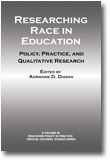
Researching Race in Education
Policy, Practice and Qualitative Research
By:
Adrienne D. Dixon, University of Kentucky
A volume in the series: Education Policy in Practice: Critical Cultural Studies. Editor(s): Rodney Hopson, American University. Edmund Hamann, University of Nebraska-Lincoln.
Published 2014
In traditional educational research, race is treated as merely a variable. In 1995, Gloria Ladson-Billings and William F. Tate, IV argued that race is under-theorized in education and called for educational researchers to pay closer attention to the relationship between race and educational inequity (Ladson-Billings and Tate, 1995). In particular, they argued, drawing on legal scholar, Derrick Bell’s notion of Racial Realism (Bell, 1995), that racialized inequities are not accidental or aberrant; rather, racialized educational inequities are the result of particular and specific policies and practices that are designed to maintain particular forms of dominance and marginalization. More specifically, Bell and later Ladson-Billings and Tate, argue that racial inequity persists despite liberal policies and legislation that were ostensibly designed to eradicate it. The Racial Realist perspective takes into the consideration the longevity and history of racism, racial inequity and White supremacy in the U.S. and serves as a mirror to reflect back the limitations of proposed policies and legislation that fail to address those issues. In this way, Critical Race Theory and the scholars who draw on CRT, view our work as an important “check and balance” in the effort toward racial equality.
CONTENTS
Forward by Gloria Ladson-Billings. Introduction by Adrienne D. Dixson, editor. Section I: Historical view of race research in education. Chapter 1: Richard Milner, University of Pittsburgh & Elizabeth Selfe, Vanderbilt University, Critical Race Theory Moments as Sites of Evidence in Teacher Education. Chapter 2: Kristen Buras: Georgia State University, From Carter G. Woodson to Critical Race Curriculum Studies: Fieldnotes on Confronting the History of White Supremacy in Educational Knowledge and Practice. Chapter 3: Adriane Williams, West Virginia University, Race Matters in Education Policymaking and Implementation. Section II: Race and educational policy and practice. Chapter 4: Julio Cammarota & Luis Moll, University of Arizona, Teachers and Students Living Culturally and Intellectually: Ethnographic Mediation in the Urban School Context. Chapter 5: Teresa McCarty, UCLA and Ofelia Zepeda, University of ArizonaThe Racializing Function of Medium-of-Instruction Policies in Indigenous/Minority Schooling. Chapter 6: Rema Reynolds: University of Illinois at Urbana-champaign, From Their Perspectives: Using Critical Race Theory to Examine Parent-School Relationships African American Middle Class Parents Experience in Public Secondary Schools. Section III: Teaching race and “doing” race research. Chapter 8: Kenneth Varner: Louisiana State University, Toward a theory of the ethnography of whiteness. Chapter 9: Anthony L. Brown, University of Texas-Austin, Complex orientations of racial insider status: A Case of an African American Male Researcher. Chapter 10: Adrienne D. Dixson, University of Illinois at Urbana-champaign & Vanessa Dodo-Seriki, University of Houston at Clear Lake, “I’m no longer interested…”: Challenges of researching race for scholars of color. Chapter 11: Keffrelyn D. Brown, University of Texas-Austin, When One Door Opens, Another One Closes: Experiences and the Contradictions of Centering Race in Ethnographic Research Chapter 12: Thandeka Chapman: University of California at San Diego Teaching race and qualitative research in education in the United States.
-
Paperback9781623966768
Web price: $45.04 (Reg. 52.99)
-
Hardcover9781623966775
Web price: $80.74 (Reg. 94.99)
- eBook9781623966782

- Policy & Politics of Education
- Education Research
- Social Issues in Education
- Black Studies
- Urban Education
- EDU000000 - EDUCATION: General
- EDU029000 - EDUCATION: TEACHING METHODS & MATERIALS: General
- EDU037000 - EDUCATION: Research
-
 Educated for Change?
Muslim Refugee Women in the West
Educated for Change?
Muslim Refugee Women in the West
-
 Learning to Hide
The English Learning Classroom as Sanctuary and Trap
Learning to Hide
The English Learning Classroom as Sanctuary and Trap
-
 Navigating the Volatility of Higher Education
Anthropological and Policy Perspectives
Navigating the Volatility of Higher Education
Anthropological and Policy Perspectives
-
 Paths to the Future of Higher Education
Paths to the Future of Higher Education
-
 Placing Practitioner Knowledge at the Center of Teacher Education
Rethinking the Policies and Practices of the Education Doctorate
Placing Practitioner Knowledge at the Center of Teacher Education
Rethinking the Policies and Practices of the Education Doctorate
-
 Revisiting Education in the New Latino Diaspora
Revisiting Education in the New Latino Diaspora
-
 The Construction, Negotiation, and Representation of Immigrant Student Identities in South African schools
The Construction, Negotiation, and Representation of Immigrant Student Identities in South African schools

